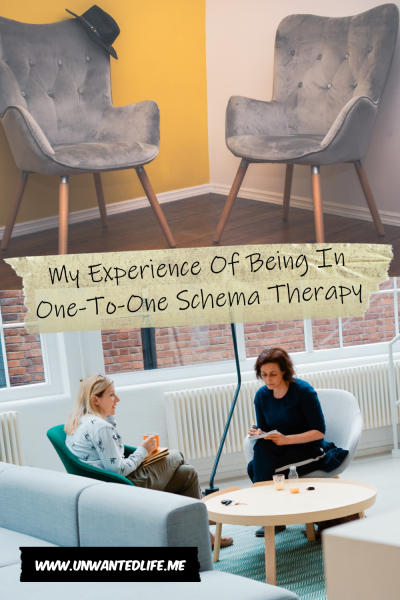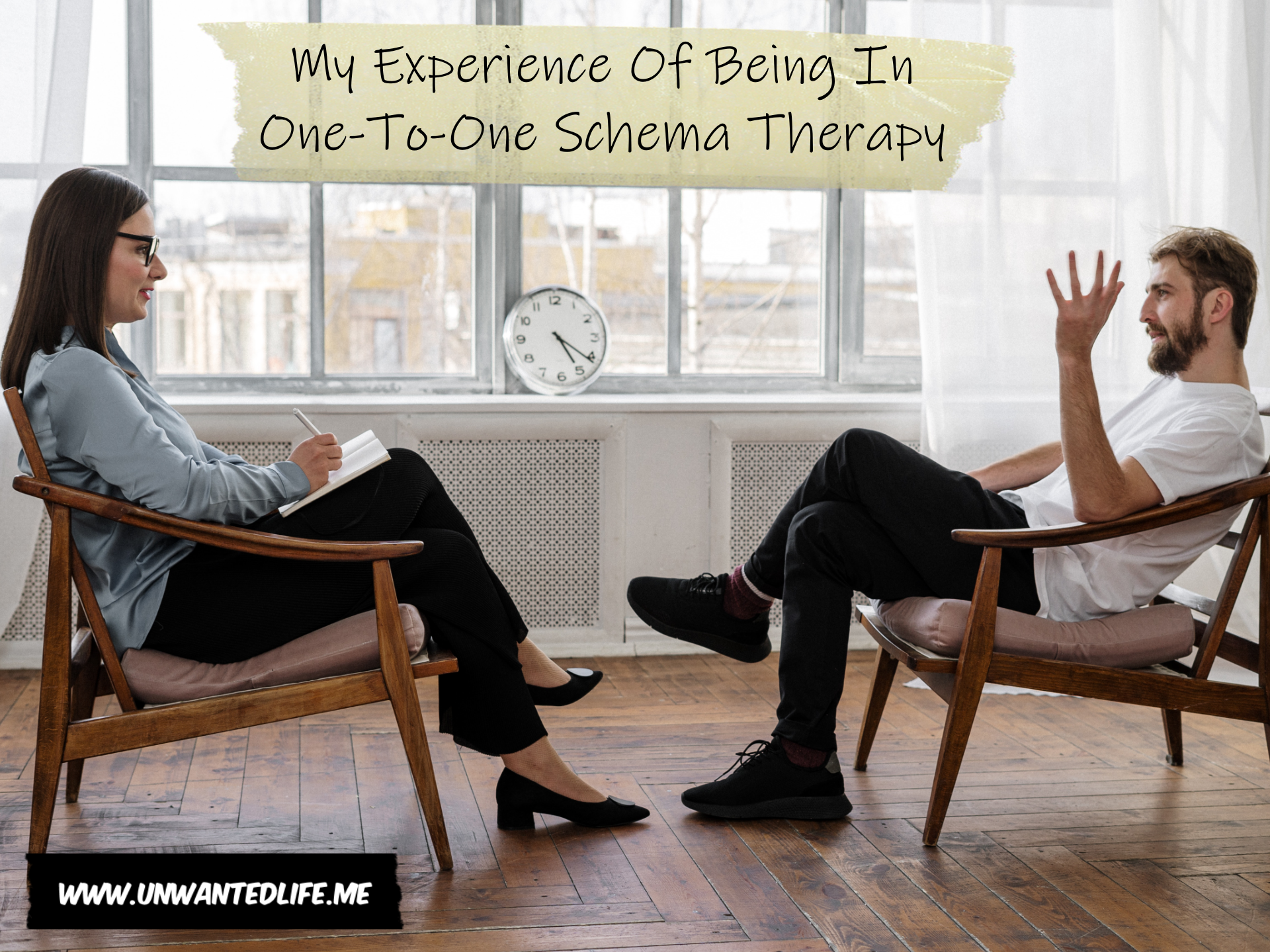After my horrific experience with my Mental Health Trust regarding my medication (Taking Antidepressants And Being Forced To Go Cold Turkey), I was eventually, many years later, given my first talking therapy. This is my first proper experience with one-to-one therapy as a client.
What Is Schema Therapy?
Schema Therapy was designed to address deeper-level maladaptive schematic beliefs and interpersonal patterns that haven’t responded to other first-line therapeutic approaches (The British Psychological Society). This makes it strange that schema therapy was the first spoken therapy I was offered and had done, although I was told it was going to be cognitive behaviour therapy (CBT).
A schematic belief is a belief we hold that is often shaped by our childhood experience but is about ourselves, the world, and other people (Noone et al., 2015). For example, if you had a childhood like I did where everyone made you feel unwanted, that you’re useless and ugly, then you run the risk of these thoughts becoming your schematic belief about yourself.
My Experience
I only realised once we started therapy and started talking about schemas that it wasn’t, in fact, CBT I was having, which was quite the surprise: not the best way to find out.
During this therapy, I opened up about the one aspect of my anxiety disorders that I rarely share with anyone (The Weird Behaviour Of My Anxiety Disorders), because of the embarrassment and shame it causes me (the fear of losing control of my bladder and bowels). Anything else about my past and my problems, I’m willing to tell anyone and everyone willing to listen. But this one thing I don’t. The fear of incontinence is not something someone of my age, at the time or now, should be worried about, especially when I’ve never actually experienced it happening.
Because of this, the therapist suggested we try triggering a psychotic episode during one of the sessions. I agreed to do this if we could change our appointment times because I didn’t want to deal with the full force of a psychotic episode whilst using rush-hour public transport to get home.
Thus, my appointment time was changed to midday so that we could cause my anxiety disorders to trigger psychotic episodes in the sessions. However, even though this was the plan, we never actually followed through on it. This was very disappointing.
Nor did we do anything else that would have helped with my anxiety disorders, like graded exposure work. This was why I wanted to do CBT in the first place, to get out of my comfort zone. We just kept talking about my schemas and took no action to attempt to change anything.
We talked about other stuff as well. We completely opened the can of worms that were all my problems. Accept, this never led to anything, no attempt to work out solutions through self-actualisation or interventions, nothing. The can of worms was just left open.
What made matters worse, about three-quarters of the way into the year-long therapy sessions, I started to suffer from heart problems (I was first diagnosed with supraventricular-tachycardia and then inappropriate sinus tachycardia, as my heart problem changed once I started taking medication for it). Because it was going to be another year or so before I was put on medication for my heart problem, I was really struggling day-to-day and was constantly in pain.
If that wasn’t enough, it was also the same time when I was trying to help an old friend: helping them escape domestic abuse after having their sternum broken. They were also struggling with heroin addiction, which I managed to help them get off, only to realise they were also an alcoholic and an abusive alcoholic at that.
I hadn’t realised they were an alcoholic until I said they could stay with me whilst they sorted themselves out. I also agreed to help them find a place to live and find work so they could get their life back on track.
The stress of dealing with all this and my newly emerging heart problems made my life miserable. I had to call in sick for work because I couldn’t sleep and I couldn’t move because the stress had caused my chest pains to be so bad that it felt like I was being kicked in the rib cage constantly 24/7. It really didn’t help that the person I was trying to support was an abusive drunk.
Therapy Coming To A Close
All the issues with my physical health and trying to help my friend, all took place during the latter months of the year’s worth of therapy sessions I’d been given. Even though I brought all of this up during these sessions, they still planned to end the therapy at that one-year mark. This is in spite of the fact that in those last few months, I’d been deteriorating rapidly and was in extreme desperation for support.
I was far, far worse than before I started the therapy, not just because my physical health and my personal situation had gone down the toilet, but because the therapist had opened the can of worms on my mental health and done nothing with it, not even closing the can they opened.
There was no attempt to offer me the support I needed, and I wasn’t added to a new waiting list for therapy, either. All I got was a sheet of paper with some hotline numbers in case I considered suicide.
I ended up having to quit work for the mental health charity a week after the therapy ended, and I’d go on to quit working for the substance abuse charity later that year. I just couldn’t cope due to my heart condition massively affecting every aspect of my life. Nor could I handle how my mental health problems made my heart problem far worse, and vice versa. No one was interested in helping me at the Mental Health Trust.

My Takeaway From My Schema Therapy Experience
The only takeaway from the schema therapy was that I had schemas that were contradictory to each other. That was it.
It wasn’t all the therapists’ fault. I had terrible time management skills at the time because of the difficulties I had with leaving my home. I couldn’t leave my place unless I left it last minute. This would give me the extra push I needed to go outside due to the onslaught of intrusive thoughts caused by my anxiety disorders (for more information on that, see my previous article by clicking here).
However, the more I think about my time in this therapy, over the years, the more I realise we didn’t actually achieve a single thing with my mental health. Every single improvement that I’ve made in my mental health has been done through self-therapy, using methods to link graded exposure.
The Point
The point of this post is that Mental Health Trusts need to be flexible in the help they offer. Clients are individuals, and their conditions will manifest differently and will present with multiple problems that need to be factored in. Furthermore, events in their personal lives will change the treatment and care they’ll need, and the Trusts should be willing, and able to, adapt to these changes.
They also need to offer the right and continued support to their client’s needs, which I needed. Instead, I felt ignored and abandoned in a time of great need, where the stress and anxiety of the situation I was in was leaving me bedbound, in agonising and constant pain, too dizzy to stand, with no sense of balance, blurred vision, and a constant feeling like I was going to vomit.
I was left to deal with a situation I couldn’t handle, a situation they were fully aware of, a situation they washed their hands of.
As always, leave your feedback in the comments section below. Also, feel free to share your experiences with one-to-one therapy in the comments section below as well. If you want to stay up-to-date with my blog, then sign up for my newsletter below. Alternatively, get push notifications for new articles by clicking the red bell icon in the bottom right corner.
Lastly, if you’d like to support my blog, then you can make a donation of any size below as well. Until next time, Unwanted Life readers.
References
Noone, D., Ames, C., Hassanali, N., Browning, S., Bracegirdle, K., Corrigall, R., Laurens, K. R., Hirsch, C. R., Kuipers, E., Maddox, L., Fowler, D., & Jolley, S. (2015). A preliminary investigation of schematic beliefs and unusual experiences in children. European Psychiatry, 30(5), 569-575. Retrieved from https://doi.org/10.1016/j.eurpsy.2014.12.006.


Thanks for sharing your experience. I’ve had my bouts with mental health, never been diagnosed (although I know) never had therapy. Where I come from, there is zero mental health awareness. If you’ve got a problem, sort it out yourself-thats what people think. It’s tough investing all that time and energy on therapy and having poor results. I hope things get better for you.
That’s a shame that you have no mental health awareness where you’re from. Looking after your own mental wellbeing is really important, and that starts with awareness
Fantastic post, and I think it will help others to read your honest and open experience. I’m sorry you have been so let down by the mental health services, and glad that you’ve managed to find help you need (albeit from your own research).
When you say doing your own research, it just makes me think of antivaxxxers and the harm they cause
Yes that’s very true, there is a lot of misinformation around
This sounds very beneficial, and I never heard of this. THanks for sharing!
~Michelle
What part sounds beneficial?
Great post, Mental health is one of those things where people are only now feeling free to talk about their struggles. Mental health awareness is moving in the right direction.
Thank you
I had not heard of one-to-one schema therapy before, but you explained it well. The links you provided were also very helpful. It seems this therapy has been around for quite awhile! However, it sounds like the therapist you saw was not a good match. Are you allowed to request a different practitioner where you live? Here in the USA, I would have been able to change therapists without too much trouble. The therapist you saw did not sound helpful. I would also question any therapist who suggested that it would be a good idea to trigger a psychotic episode. This seems like a recipe for disaster. I’m so sorry your experience with talking therapy was not a good one. Unfortunately, it can take a lot of trials to find a good therapist.
Unfortunately, you don’t get much choice when you’re getting therapy for free on the NHS.
I was having daily psychotic episodes, sometimes several times a day. Basically whenever I left my house, got stressed, had anxiety, or had a hypo. Having one in a safe setting helps you to overcome them, at least for my version which was triggered by anxiety. Exposure therapy like this which I ended up doing as self-help was the single best thing I’ve ever done for my mental health and psychosis
This is the first time I heard about schema therapy… good to learn something new! I never had therapy but I understand how upsetting it can get when you don’t have the right therapist for you. Plus the rush hour going home can really stress you out.. Thanks for sharing your experience!! Helpful as always.
https://www.lifebeginsattwenty.com/
Rush hour certainly was a horrible experience for me. There’s nothing worth than being crammed on public transport while experiencing psychosis